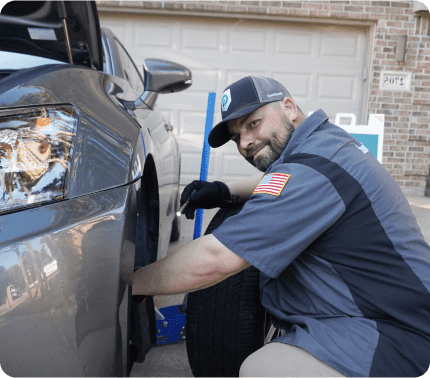Best Mobile Mechanic in McKinney
Mechanic Comes To Your Home
2 year Service Warranty
7 days/week, 9 am - 9 pm
Meet Our Certified Mechanics In McKinney
Carlos
422 reviews
Background checked
Passed Goodhood's rigorous test
Carlos was thorough and friendly and explained everything. What a great experience!
- Car
2020 Honda Accord
- Amount Paid
$162
More Goodhood Auto Locations
McKinney Mobile Auto Repair Service Area
Cars We Service In McKinney, tx
Best Mobile Mechanic in McKinney, TX
Are you tired of waiting all day at an auto repair shop? At Goodhood Auto, we’re revolutionizing the typical repair shop experience. We’re your go-to mobile Mechanic in McKinney, bringing ASE-certified mobile Mechanics straight to your door.
Skip the uncomfortable experience of sitting in a waiting room for hours on end. The next time you need an oil change or other automotive service, book one of our mobile Mechanics and get back to your day.
Everything else comes directly to your door. Isn’t it time for a Mechanic to come to you?
Meet Our Certified Mobile Mechanics in McKinney
At Goodhood Auto, we ensure your car or truck is well taken care of. All of our mobile Mechanics in McKinney are insured, licensed, and ASE-certified. If you book an auto service with us, you can rest assured that your Mechanic has passed our rigorous standards. From routine tune-ups to complex diagnostics, the mobile Mechanics on our team are equipped with the knowledge and skill to handle any service you need.
Experience friendly, convenient, and professional repairs with our certified mobile Mechanics in McKinney. At Goodhood Auto, we strive to make auto repair easier than ever before.
Mobile Auto Repair in McKinney, TX
Our mobile Mechanics in McKinney offer a wide range of services to keep your vehicle in excellent shape. Routine repairs, major service, preventative maintenance—we can tackle whatever you need.
Mobile Oil Changes — Skip the wait at the repair shop. Our mobile Mechanics bring oil changes straight to you. Goodhood Auto members receive free unlimited oil changes!
Exhaust System Repairs — If your car is making odd noises, our Mechanics will inspect your exhaust system and emission control system to ensure they are functioning properly.
Battery and Alternator Services — Can’t get your car to start? Our mobile Mechanics will ensure your battery and alternator are functioning and get you back on the road in no time.
Brake Repairs — If you hear squeaking or grinding when you brake, it’s time to call Goodhood Auto. We'll deliver and install brand-new pads or rotors straight to your driveway.
Transmission Service — Having trouble shifting? If your transmission needs maintenance or repair, Goodhood Auto can help.
Wheel Alignment — Achieve balance and alignment without the hassle of waiting rooms, right at your location.
Suspension Service — Issues with shocks, struts, or general suspension? We'll address it on the spot!
Radiator Service — If your vehicle is overheating or emitting odd smells, we'll inspect the cooling system to prevent a meltdown.
Engine Repair — Dealing with engine issues? Our Mechanics diagnose and resolve any problems to keep your engine firing on all cylinders.
Tune-ups — Ensure your vehicle's spark, fuel, and air systems are in peak condition with Goodhood Auto’s thorough tune-up services.
With Goodhood, you can expect excellent service and complete peace of mind every single time. We even offer a two-year, 24,000-mile service warranty on parts and labor!
McKinney Mobile Auto Repair Service Area
Our mobile Mechanics are always ready to serve you throughout McKinney. No matter where you’re located, we’ll get to you fast and provide exemplary auto services that you can count on.
Cars We Service in McKinney
At Goodhood Auto, our McKinney mobile Mechanics service a variety of makes and models. Whether you just purchased your vehicle or it’s stood the test of time, we will treat your baby with the utmost care. You can rest easy when you trust Goodhood with your mobile Mechanic needs.
FAQs
